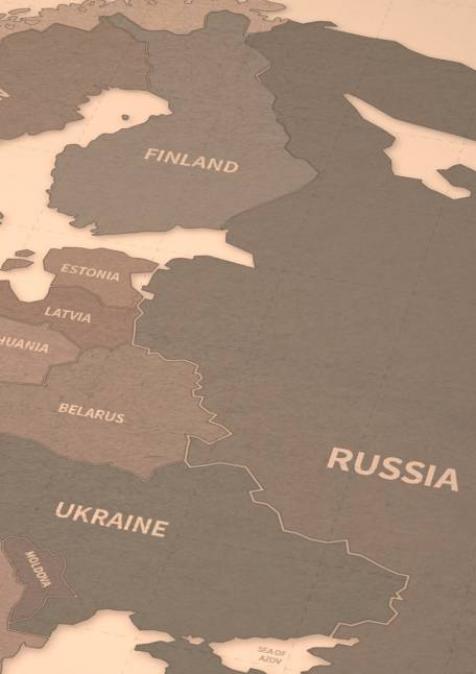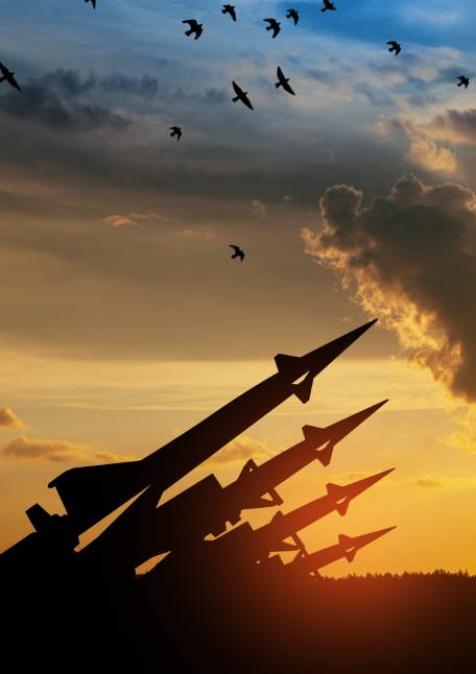Publications /
Opinion
West Africa has always played an essential role in African geopolitics. Although less thought of than north, south and east Africa, because of their envied strategic openings into both the Mediterranean Sea and Indian Ocean, West African countries are transforming themselves into a major African hub. For Britain, the completion of Brexit heralds a new era in its contemporary history. In this framework, West Africa is a crucial region for the United Kingdom’s long-term strategic goals in Africa for three reasons:
(1) The geostrategic position of the Mediterranean; (2) the significance of West African energy resources; and (3) mitigating rising security threats.
Key takeaway points
- West of the Mediterranean is an area that is difficult to bypass for maritime trade in raw materials and goods between Europe and Africa, and the positioning of the UK in the region is advantageous for its African policy.
- Geo-economic and security interests explain the growing presence of the UK in West Africa. The significance of energy resources and the ominous security concerns are remodeling the region into an artery of African geopolitics, and the UK intends to play a significant role.
- Russia is a competitor to the UK for influence in West Africa; the UK and Russia are unlikely to cooperate and leaders in the region look to Russia in the context of rising instability
1- The Geostrategic Role of the Mediterranean in the Projection of United Kingdom Influence in West Africa
Because of the indisputable forces of geography and history, the Mediterranean has always played a key role in relation to West Africa. The UK is incrementally coming back to the zone of influence and is bound to use the geographic proximity of the Mediterranean to its benefit following the UK-EU divorce. The area includes the British Overseas Territory of Gibraltar, which has played a historical role since the 1713 Treaty of Utrecht, in which Spain ceded control of Gibraltar over to Britain, allowing Britain to control the Strait of Gibraltar, strategically significant as the exit point of the Mediterranean and the entry to the Atlantic Ocean. This chokepoint is vital to West African economies trading with Europe, and the UK’s presence in the Mediterranean is a guarantee of influence over West African commerce. Thus Gibraltar, once a pillar of the UK’s maritime and trading power, has a geostrategic significance in guaranteeing access to Africa and staying ahead of allies and rivals alike.
In this geographical layout, Britain has shown its intent to improve relations with Northwest Africa, starting with Morocco. The two countries intend to build a strategic partnership and signed in October 2019, the Morocco-UK association agreement for the post-Brexit period. Morocco is the first African investor in West Africa, and the relationship is full of potential synergies. Morocco has an ambitious target of producing 52% of its electricity from renewable energies by 2030, and the UK is the first G-7 country to commit to a net-zero emissions target by 2050. They are in the same time zone, and at only three hours’ direct flight away from mainland UK, Morocco is the UK’s nearest non-European neighbor. The Moroccan agro-food industry is ideal for British businesses looking to invest and supply their markets with products previously provided by EU member states. Although the UK wishes to develop relations with many African countries, Morocco seems to be a critical link between the UK and West Africa.
Morocco’s geostrategic position for the UK is further enhanced by Tangier-Med, the largest port on the Mediterranean and in Africa by capacity, which is located on the Strait of Gibraltar. This explains why Morocco is continuously described as the gateway to Africa[1].
In contrast to central and eastern Mediterranean countries, known for their instability, humanitarian tragedies and power competition between the world and regional powers, the western zone provides the UK stability and depth needed to project influence towards the booming economies of West Africa, and to manage a strategic zone of Euro-African relations.
2-The Growing Significance of West African Resources for the United Kingdom
The UK has emphasized the need to re-boot its post-Brexit economic cooperation in Africa. In this direction, the UK-Africa Investment Summit held on January 10, 2020, in London concluded deals worth around £6.5 billion, with most going to North and East Africa, while West African countries generated a timid £950 million in commercial contracts. The figure does not demonstrate why West Africa matters for the UK, but ongoing, highly strategic projects in the field of energy paint an entirely different picture. Generally, the complicated and competitive nature of the oil and gas sector means wherever the big company goes, the government follows. The UK is multiplying contacts in the region, to protect energy interests in Nigeria (by far its biggest supplier of crude petroleum), where British company Savannah Petroleum is injecting $315 million to acquire and invest in gas assets. British companies also manage two highly promising projects:
1- The Greater Tortue-Ahmeyim LNG project straddling the Mauritanian-Senegalese maritime border, operated by BP, and projected to produce 10 million tons of LNG per year, with the start of commercial production scheduled for 2022;
2- The Niger-Benin crude pipeline. A 1980km cross-border pipeline connecting the Agadem Rift Basin in Niger to Port Seme Terminal on the coast of Benin, scheduled to be commissioned in 2021 and capable of delivering up to 90,000000 barrels per day of crude oil. Savannah Petroleum covers almost 50% of the Agadem basin.
The magnitude of these energy projects explains the British decision to increase its footprint in the region including by opening new embassies in Chad and Niger.
West Africa is now a vital base for UK energy security and influence in the future global energy market.
3- Security Concerns Threatening National Interests
Although the UK security policy in Africa appears altruistic, it is, in fact, more energetic and intervenes in different ways to manage several security issues in West Africa. France’s Barkhane is supported by the UK’s ‘Sahel: Defence and Security Programme’, destined to end in March 2021, and meant to project UK influence “through multilateral and bilateral cooperation and increased promotion of Global Britain’s core values”[2]. The UK is also further stepping up its military presence in the Sahel with 250 soldiers joining the UN mission in Mali to train local forces. Principally, much of the UK’s security response to threats is channeled through a multilateral framework, considered as the standout feature of British diplomatic doctrine.
In terms of maritime security, the UK finances several initiatives to stop piracy in the Gulf of Guinea. The Gulf is a vital route for the Europe-Africa oil trade, but is the scene of constant attacks from armed pirates. In 2018, the International Maritime Bureau stated that a third of all maritime piracy and robbery incidents took place along West African coasts, of which a majority were in Nigerian waters[3].
The British perceive piracy as a threat that could upset the oil supply and wish to eradicate it once and for all. The European Union has the same concern, and possible cooperation could eliminate the practice, but the two partners have more urgent concerns when it comes to security in West Africa. The so-far undefined UK-EU future relationship has left a power vacuum in which terrorist groups and geopolitical rivals are becoming part of the Sahel security dilemma.
Terrorist groups have moved their center of gravity from north of Mali south-eastwards to Burkina Faso, in the Liptako-Gourma triangle area between Mali, Niger and Burkina Faso. The latter country faces a grave crisis with a rising toll of casualties and the internal displacement of 700,000 people. Mohamed Ibn Chambas, the Special Representative of the United Nations Secretary-General for West Africa and the Sahel, stated at the first UN Security Council meeting of 2020 that “the geographic focus of terrorist attacks…is increasingly threatening west African coastal states”[4]. British officials are now concerned the Sahel and West Africa are close to the point of irreversible violent chaos.
The UK defense establishment is still living with the after-effects of the Iraq and Afghanistan wars, and the UK cannot fix West Africa’s security problems. But nor does it have the luxury of ignoring them. Expansion of Russian geopolitical clout is alarming NATO, the bedrock of UK defense. Russia is gradually catching up with Europe and China in West Africa, through arms sales, military cooperation and provision of advice. The Russian government has signed military agreements, with Burkina Faso, Mali, Niger and Nigeria, to train forces and improve international security coordination to fight terrorist groups. Ever since the successful anti-ISIS military adventure in Syria, Russia has attracted African leaders concerned about armed groups disrupting state control over large territories. In the hard power domain, the UK’s famous soft power is incapable of attenuating growing Russian military influence.
In this new security paradigm, West Africa, which seemed strategically less relevant than the Middle East a few years ago, is an essential zone for the UK’s national security.
[1] See ‘UK wants to make Morocco Hub and Gateway to Africa After Brexit’, available at
https://www.diplomatie.ma/en/uk-wants-make-morocco-hub-and-gateway-africa-after-brexit.
[2]See Sahel: Defence and Security Programme, available at
[3] See ‘Piracy and Armed Robbery Against Ships’, available at
https://www.icc-ccs.org/reports/2018-Q2-IMB-Piracy-Report.pdf
[4] See ‘Russia Shares UN Concern About Rising Terrorism in Africa’, available at https://www.indepthnews.net/index.php/the-world/russia/3285-russia-shares-un-concern-about-rising-terrorism-in-africa






